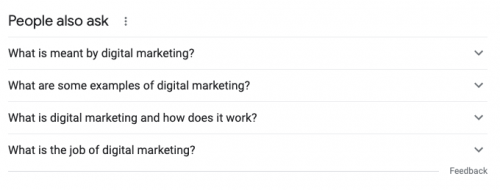If you’re an advertiser that allocates budget toward SEO, PPC, or paid social, learning how to optimize web content for SEO in the context of spoken search queries will be essential and paramount for your company’s durability. In the coming 2 to 3 years, advertisers are going to witness a paradigm shift in the way that consumers search for content online. As virtual assistants like those found in Google home, Apple iPhone, or Amazon Echo become more and more ubiquitous, consumers are going to find themselves saying queries out loud in their cars, living rooms, and kitchens more and more. Below is an outline to help you prepare for the shift.
Take a Look at Google’s Featured Snippets
Google Home and Google Assistant generally read out verbatim the content of featured snippets in response to queries. To understand these strategies, let’s take a look at what marketers refer to as “snippets.”
Many of the strategies used today by SEO professionals to gain “featured” status in search queries also apply to voice search. There are three types of snippets that Google’s search algorithms produce in response to both spoken and typed queries: paragraphs, lists, and tables. Paragraphs appear to be the best-fit type of snippet for search since they compromise 85% of all featured snippets produced in response to search queries. Paragraphs are arguably the best-fit snippets for voice queries as well.
SEO Tactics for Voice Search and Virtual Assistants
Here are some tactics to employ when creating paragraph snippets in order to help improve voice SEO results.
- Wrap all questions in H1 and H2 tags: Headings are sort of like signposts for your readers to understand what topic you’re going to be discussing in your content. Be sure to have clear headings tagged with < h1 >, < h2 >, < h3 > tags to help improve your ranking.
- Ensure that all H1 and H2 text contains keywords: Search engines need to see keywords in order to match your paragraph snippets to related queries. If your headers include the keywords on which you’re trying to get ranked, then it will improve your visibility on voice as well for traditional search.
- Wrap all answers in paragraph tabs: Keeping a concise structure for your posts is going to be very helpful for your ranking. If your content has a question and answer format, make sure you wrap your answer in tags.
- Keep answers between 40 and 60 words: When writing, keep it short and sweet. It’s better for your readers, and it will give you preferential placement from search engines.
- Structure FAQ pages by topics and keywords instead of numbers: Think of FAQ pages as another place for keywords. Having headers that list topics instead of numbers will help with SEO for traditional search and voice.
See What Other People Ask
In addition to employing these basic voice SEO tactics, there are other voice specific tips that will help marketers improve their search results for voice. Targeting weak answers from your competitors and ensuring that your answers are SEO optimized using the tactics above is a good place to start. You can also try drafting responses to “people also ask” queries, as seen below.
FAQ Content for Voice SEO
The FAQ section of your website is a good place to focus if you’re trying to bolster traditional Google search rankings. Arguably, this tactic should also work with voice search as well. In the interest of bolstering search results for both traditional search and voice, keep the below points in mind when drafting FAQ content:
- Design and UI: Make sure your FAQ content is ready for mobile, desktop, or any other user contexts in which users consume your content.
- Technology: Leveraging AI-based technology to deliver content via voice assistant, chatbots, your website, etc.
- Promotion: Driving traffic to your FAQ page via paid search.
- Specificity: Improve SEO for both traditional search and voice by keeping your content as specific to the queries you’re seeing as possible. Also: make sure your language is specific to your vertical.
Preparing for the Voice SEO Search Takeover
As the number of digital personal assistants in homes, cars, offices, and headphones continues to grow, so too will the demand for quality voice search results. Experts at Google and Amazon all agree that voice search is becoming increasingly important. For advertisers, it is essential to keep up with best practices for voice search SEO.
Alexa may be able to tell you the weather, but can she help you reach the first page of Google? Let the digital experts at Premiere Creative help you launch your next voice SEO campaign. Contact us today or give us a call at (973) 346-8100 for more on the future of SEO.


